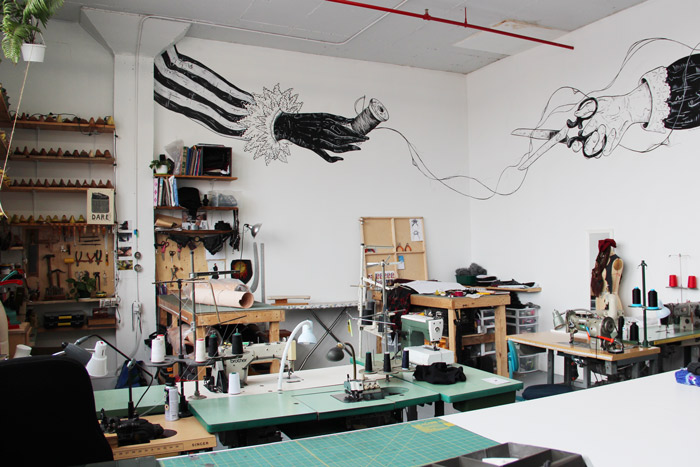A few generations ago, sewing was a required class in American schools. Today, many people no longer know how to sew; however, this is slowly changing—sewing is experiencing a resurgence in popularity among DIY enthusiasts. Increasingly, many people are recognizing the plethora of benefits to sewing—not only does it reduce stress, but it equips one with the knowledge to produce one-of-a-kind pieces for themselves or for profit. But how does one get started without the knowledge or a sewing machine?
That question has been answered by a cooperative maker-space in Rosemont called The Common Thread/Le Fil Commun. The sewing co-op, in which artists share materials and knowledge for $10 an hour, describes itself as "a wearable arts studio" that supplies a workspace, industrial sewing equipment, and materials to its members. Founded in November 2016, the Common Thread offers open studio sessions on Saturdays from 11 a.m. to 6 p.m. During this time, for a nominal fee, the studio is open for sewing novices to work alongside experienced tailors or to attend drop-in workshops.
According to co-founder and Montreal-based artisan Kiri Skuce, one of the goals of the Common Thread is to provide an accessible and affordable space for people to explore the art of sewing. Skuce was inspired to form a sewing collective after noticing a gap in craft-based education between the beginner and professional levels.
“I think that in starting this project I have many different goals,” Skuce said. “I think the short-term is to just make [sewing] more accessible for people who just want to get into it because there is pretty much nothing available between not knowing how to sew at all and going into a full-time three-year degree [….] If you already know how to sew, and you need a place to work [as a professional], there isn’t anywhere [to go].”
With the assistance of mentors, neophytes can realize projects they wouldn’t be able to accomplish at home. Amateur craftspeople can learn everything from making patterns to working with industrial machinery.
[metaslider id=51485]
“So far, mostly novices I would say [come in to the Common Thread],” Skuce said. “People come in to learn the basics. [Our members often] have a project in mind, but don’t have the space to work on it at home […] and with this collection of machines, you can make pretty much anything [….Sewing] can be easy to get into, you just need all of the right things, so we hope to provide that.”
Crafters at the cooperative often find that making their own clothes gives them a newfound appreciation for the material goods they consume on a daily basis. The hard work of making a new item of clothing from scratch can be especially rewarding for patrons. Skuce noted that when people make items themselves, they tend to gain a heightened appreciation for manufacturing that lasts long after the class.
“There is a really interesting thing when you go through that process [of sewing your own clothes] where you realize how much work goes into something,” Skuce said. “Suddenly, something as meaningless as a shirt […] being involved in [its] creation process readjusts your value systems when it comes to these objects that we take for granted. I think it is the first step to become more sustainable in the things that we consume, because if you realize how valuable a thing is, you are going to maintain it.”
Looking ahead, Skuce hopes to grow the Common Thread by expanding its studio space and services for first-time seamstresses. In the coming months, the Common Thread will offer classes for beginners, including belt and sandal-making. In the meantime, the Common Thread’s members continue to support each other as they learn in a collective space.
“Work gets easier when you are with more people,” Skuce said. “[….] When you have a dynamic of sharing and trust, it is contagious.”








